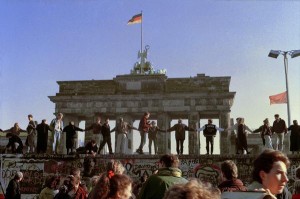The Berlin Wall in our Minds
 Europe is celebrating the 20th anniversary from the Fall of the Berlin Wall – an event that has changed forever the course of modern history. For us it was more than a miracle to see how people gathered together free from fear of persecution to celebrate the Resurrected Christ. It almost seemed like they celebrated their own resurrection, the resurrection of the Bulgarian Church of God, from the years of trials and persecutions under the Communist Regime.
Europe is celebrating the 20th anniversary from the Fall of the Berlin Wall – an event that has changed forever the course of modern history. For us it was more than a miracle to see how people gathered together free from fear of persecution to celebrate the Resurrected Christ. It almost seemed like they celebrated their own resurrection, the resurrection of the Bulgarian Church of God, from the years of trials and persecutions under the Communist Regime.
But 20 years after its fall, the Berlin Wall still stands tall in the eastern European mindset. This is especially true for the country of Bulgaria and the evangelical churches operating on its territory. The Bulgarian Pentecostal Movement has experienced more structural and leadership difficulties in the past decade, than they have in their almost centennial existence. The post-totalitarian model of church leadership had a destructive aftereffect on the two major wings of the movement, as the historically more independent Bulgarian Church of God has experienced a series of biannual splits in the past six years, while the Assemblies of God represented in Bulgaria by the Pentecostal Union Churches is undergoing leadership changes which will leave their mark on its identity as a movement.
The context of ministry is becoming even more accelerant in light of the first 100 days of the new center-rightist Bulgarian government, proposing even newer changes in the religious laws of the country which will limit the government registration only to churches who can prove a membership over 5,000 people. This limit may become unreachable as many church members are among the 4 million Bulgarians who in the past decade have left the country in search of work and a better life and now reside in Western Europe or the United States. If such legal change indeed occurs, more red tape is coming in Bulgaria against the preaching of the Gospel, religious education and faith as a whole, which will be put under the authority of a government religious council upon the recommendation of the European Union and after the Eastern Orthodox monopolistic paradigm of the Russian Federation.
The three local church models which comprise the Bulgarian Evangelical Movement are not ready to face this new brutal attack against their religious freedom. The small village churches, led mostly by mission representatives sent by larger church communities, often waver between different denominations, which results to doubling and some times tripling their registrations thus becoming an easy first target to any new government restrictions.
Over half of the midsize city churches (70-95 members) have emerged after a church split, which has remained as an unfortunate part of their identity, which reoccurs in their life and ministry. This process is valid in both Bulgarian and other ethnic communities in the country with an emphasis on the Roma Gipsy churches. The result is more small and weakened churches or even home group communities who never undergo normal church growth, thus remaining distant from the outside religious life and often closing themselves to a strangely sectarian existence.
Finally, a few nondenominational churches have retained their own evangelical identity leaving the mainstream denominations and continue to build relationships with sponsoring religious organizations outside of Bulgaria. Having gained financial and leadership independency, they have been successful to complete their building projects and enjoy temporary autonomy. Thus, a dozen of large Bulgarian congregations with several hundred in attendance, located in the capital Sofia, the Danube River city of Rousse, the Black Sea ports of Bourgas and Varna and the industrial towns of Plovdiv and Stara Zagora, have undertaken building projects perhaps as more of a business opportunity. But the aftereffect of their bi-decadal efforts, have shifted their focus from ministry toward building ministry centers and have left their financial resources drained and their supporters demotivated in the midst of global economic crises. And so the Wall remains in the mindset and the crises within the identity of the Bulgarian evangelical believer.
Some two decades ago at the Berlin Wall, President Reagan turned to Soviet Prime Minister Michael Gorbachev with the words: “Tear this wall down …” But Gorbachev cannot help tear down the Wall in our minds. This part of the liberation of the human spirit, mind and soul still remains in the perimeter of God’s grace for human salvation. The answer for global crises lies in the spiritual laws set by God in the Bible that still stands strong as the standard for living. And most important of all: the focus of the Bulgarian Church must remain not in building projects or church split competitions, but in the Spirit given mission of salvation of eternal human souls. Pray for BULGARIA.








Comments